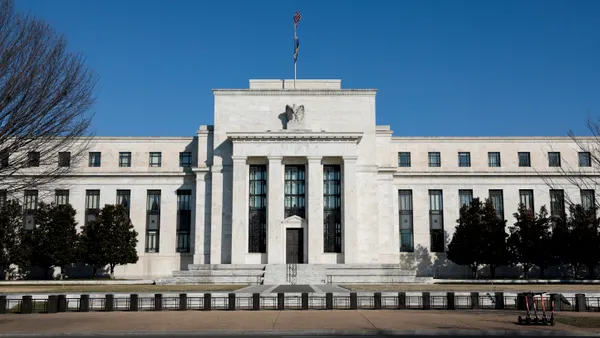Dive Brief:
- Wells Fargo beat a proposed class-action lawsuit that accused the bank of deceiving investors about its commercial loans over a three-year span in which the bank’s share price tumbled 54%, Reuters reported Friday.
- Shareholders led by the Employees' Retirement System of the State of Hawaii said they lost billions of dollars when the bank ultimately disclosed the high level of risk in many of its commercial loans.
- A judge with the U.S. District Court for the Northern District of California dismissed the charges Friday, stating the shareholders failed to prove Wells Fargo unjustifiably inflated loans, understated loss reserves or misstated its practices to investors.
Dive Insight:
In an effort to charge higher fees, entice borrowers who wanted large loans and become the biggest commercial lender in the country, Wells Fargo was incentivized to originate and sponsor risky loans, the shareholders argued.
The shareholders said Wells Fargo inflated the quality of its commercial loans and misled investors about its lending practices.
The investors allege that during the COVID-19 pandemic, Wells Fargo incurred losses in its commercial lending business as a result of previously undisclosed risks.
The Hawaii retirement fund for state employees sued Wells Fargo in October 2020, claiming the bank tweaked financial data to make commercial properties appear more valuable and investors more creditworthy, according to Law360. The bank also allowed investors to take out larger loans than should have been permitted, the outlet reported.
Judge William Alsup dismissed the charges against Wells Fargo on Friday, asserting the underwriting standards at the bank “proved largely accurate or conservative, not inflationary.”
The judge’s order agreed with Wells Fargo that the bank’s 28% overestimation and 40% underestimation of underwriting net operating income represented a valid over-under.
"Our complaint does not plead with particularity that a 'risk spread' of approximately 40% deflation and 28% inflation unduly endangered investors," the judge said.
The shareholders could amend their complaint, Alsup said.
The three-year span covered by the suit includes arguably Wells Fargo's most contentious period. The Consumer Financial Protection Bureau (CFPB) fined the bank $1 billion in April 2018, and the bank agreed to pay the Justice Department (DOJ) and Securities and Exchange Commission (SEC) $3 billion in February 2020. The Federal Reserve, meanwhile, capped Wells Fargo’s assets at $1.95 trillion in 2018. Each of those penalties stemmed from the bank's 2016 fake-accounts scandal.














